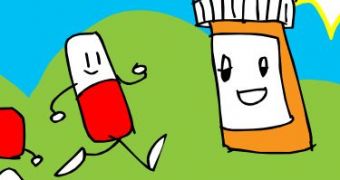The over the counter medicines for coughs, fever and colds are dangerous for children if parents and day care staff are not well informed on the dosages and their effects, says a study from Australia to be presented at the annual conference of the International Pharmaceutical Federation (FIP) today.
The team of researchers was led by Dr Rebekah Moles from the University of Sydney, New South Wales, and they carried out a study on 97 adults from day-care centers in Sydney.
For a five month period that ended in February 2010, 53 mothers, 7 fathers, and 37 day care staff were observed, the children's average age being between four and five years.
The scientists tried out different scenarios with the participants and drew conclusions depending on what the parents and day-care workers would have done.
Common over the counter drugs were available as well as several dosing devices, including household spoons, and subjects had to choose whether or not to give a medicine, when and at what dose.
As children were very small, adults were asked to measure the dose, because getting the measurement wrong is very common.
After the study period, scientists concluded that “taking all the scenarios together, 44% of participants would have given an incorrect dose, and only 64% were able to measure accurately the dose they intended to give.
“We found that 15% of participants would give a medicine without taking their child's temperature, and 55% would give medicine when the temperature was less than 38 degrees", Dr. Moles said.
“Paracetamol was the preferred treatment, even for coughs and cold, and was used most often – 61% of the time – despite the child having no fever, and only 14% of carers managed the fever scenario correctly.
Dr Moles added that they were “surprised and concerned to find that some people thought that medicines must be safe because you can buy them without prescription.
“For example, one parent said to us that if Panadol ® is available over the counter, administering a double dose couldn't do any harm and asked: What could be the worst that could happen?”
The figures are rather concerning if we think that in 2008, the New South Wales Poisons Information Center, who also receive all out of hours calls from around Australia, received 119,000 calls out of which 48% concerned accidental overdose in children, and 15% actually needed hospitalization.
In calls regarding accidental overdose in children, over 85% involved kids under five, and almost 80% of incidents concerned those under three.
“Given these figures and our findings, there is an urgent need to review the use of children's OTC medicines by parents,” said the researchers.
“We are following up this research by using mystery shoppers to visit pharmacies and see what advice they are given when presenting similar scenarios, and if we feel that the advice given is inappropriate, we will give immediate feedback and coaching so that it can be improved.
“However, the most important thing is to improve carers' understanding of when and how to give medication,” Dr Moles added.
The researchers will extend their research and try to find out if there is any connection between better or worse parent and carer skills, and level of education of socio-economic status.
If connections are established, then educational interventions will be aimed at these groups, e! Science News reports.
As dosing errors and inappropriate use of medicines lead to a large number of calls to poison centers as well as emergency hospital admissions, “it is vital that parents worldwide should understand the proper usage of medicines so that they do not continue to put their children's health at risk,” Dr. Moles concluded.

 14 DAY TRIAL //
14 DAY TRIAL //